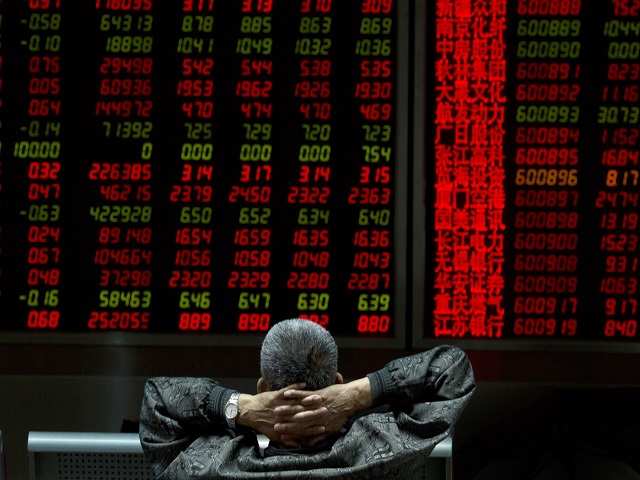INSUBCONTINENT EXCLUSIVE:
Shanghai is the world's worst-performing major stock market this year despite respectable corporate earnings, a disconnect which is feeding
growing talk that Chinese equities are now a screaming buy.
Not so fast, say brokers and analysts, who warn shares have further to fall due
to US-China trade squabbling, slowing Chinese economic growth, and a government crackdown on debt that is drying up liquidity.
Despite
China's still enviable economic growth of over six percent, the Shanghai Composite Index is down 19 per cent this year and flirting with
levels not seen since late 2014.
As a result, share valuations in relation to earnings are the most attractive in years, down as much as 50
per cent compared to 10-year averages in some cases.
Investors are waiting to pounce "like lions and leopards lurking in the grass," said
Zhang Qun, chief market strategist with Citic Securities.
"Looking at historical data, valuations are definitely appropriate (for buying),"
he said.
"But they could stay low for a while."
Nervy authorities have begun repeatedly stressing the market's overall attractiveness, and a
report last week by China's top state think tank touted "historically low" valuations.
"Value has emerged in the stock market," it
said.
Anticipation of a rebound has also been fed, brokers told AFP, by major listed firms snapping up their own shares, viewing them as
undervalued compared to the companies' fundamentals.
But the market is unconvinced: sluggish trading volume last week hit its lowest levels
in two years.
2018 wasn't supposed to be this way.
The government began the year on guard against excessive share price increases, and
optimism was fuelled by the June introduction of hundreds of Chinese companies into MSCI's global equities indices.
The move is expected to
eventually lure billions in foreign investment into Chinese shares.
The government also outlined plans to entice emerging domestic tech
giants to list shares in China rather than abroad, after first-generation champions like Alibaba and Tencent went overseas.
But 2018's
declines are by no means irrational, said Brock Silvers, managing director of Shanghai-based investment advisory Kaiyuan Capital.
"The
economy is slowing, inbound investment is declining, credit is worsening, the trade conflict is expanding, the yuan is weakening, and global
interest rates are rising," he said.
"There's little hope for positive momentum until China's economy revives or it reaches a trade
truce."
Securities giant Nomura said it expects China's economy and exports to weaken, has trimmed forecasts for key China share indices,
and was shifting money away from Chinese equities into cash.
There are potential trade-war bright spots, Nomura added, saying well-known
Chinese consumer brands could benefit from patriotic, "buy domestic" sentiment.
Any discussion of Chinese stocks requires reference to 2015,
when the Shanghai index soared as authorities encouraged buying, only to collapse nearly 40 per cent in just two months.
The episode deeply
embarrassed the Communist government, which took steps to increase its grip on equities.
Since then, the market's notorious peaks and
valleys have mostly become gently rolling hills as state-backed funds intervene more proactively to counter volatility, brokers say.
But
those hills have sloped steadily downwards as the government has less control over equities than over its currency, which it tightly
controls using its gigantic forex reserves.
Beijing also can't merely pump in money to prop up equities without potentially sabotaging its
top financial priority now: potentially toxic debt levels from the financial system.
"Beijing has methods by which to retard a stocks
decline, but it's much harder to engineer an upswing," said Silvers.
"The sun will shine on China stocks again, but night's not yet
over."
Adding to frustrations is that while the trade war has pummelled China shares, US stocks have marched to record highs.
President
Trump rubbed it in on Friday in a tweet emphasising the US would not back down on trade, saying "Our markets are surging, theirs are
collapsing".
A 65-year-old retiree who gave only her surname, Zhou, complained bitterly over this as she scanned a Shanghai brokerage's
trading board, saying individual investors like her have been wiped out.
"The market has fallen so much but our media still report China's
Nonsense!," she spat, declining to say how much she has lost.
"We aren't investing, we're throwing our lives away."

